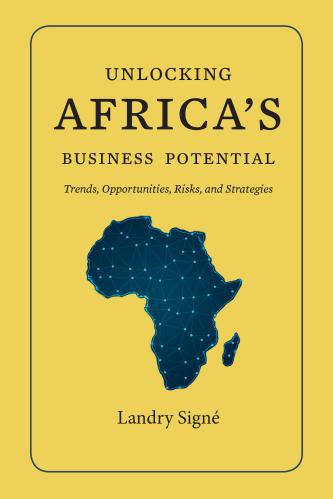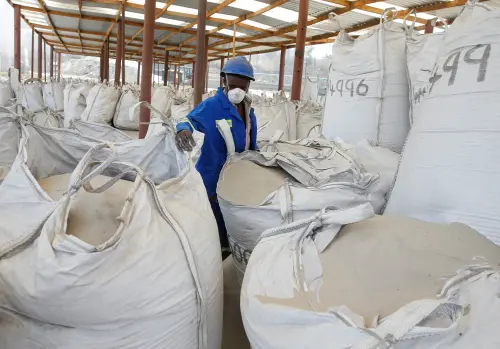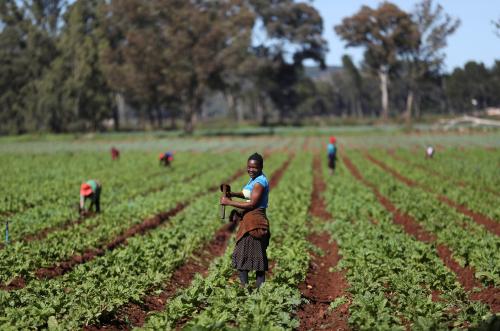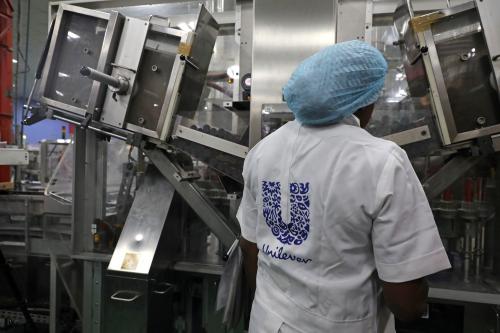In just one year, three events have permanently reshaped Africa’s trade relationship with the United Kingdom: The entry into force of the African Continental Free Trade Agreement (AfCFTA) on May 30, 2019, the official withdrawal of the U.K. from the European Union (Brexit) on January 31, 2020, and the COVID-19 pandemic in which we are currently mired. If policymakers act fast to seize the opportunities that this “ABC” triangle of events offers and reset U.K-Africa trade relations, a win-win partnership can emerge.
Dwindling UK-Africa trade relations prior to Brexit and COVID-19 can be reversed
While U.K. trade with Africa peaked in 2012 at $51 billion, by 2019 it had almost halved to $27 billion, representing only 2.4 percent of total U.K. trade. Yet untapped export potential from Africa to the U.K. is large (Figure 1), with significant gaps in apparel ($165.6 million), electronic equipment ($142.6 million), and cocoa products ($91.7 million).
On the flip side, this untapped U.K. export potential to Africa is worth over $8 billion and can be broadened beyond its current narrow base of mainly five product lines—machines, mineral fuels, vehicles, electrical equipment, and pharmaceutical products—which account for 54 percent of U.K. exports to Africa. Closing these gaps could reverse dwindling trade relations and help the U.K. reclaim its lost position as the top investor in Africa—it’s currently in fourth place behind France, the Netherlands, and the U.S., but just ahead of China—with foreign direct investment stocks of over $60 billion.
Figure 1. Africa’s untapped export potential to UK market
Source: Author’s calculations based on ITC export potential map.
How the ABC triangle creates opportunities to reset UK-Africa trade relations
The AfCFTA is estimated to bring Africa annual income gains of $134 billion per year, as it creates the largest free trade area by the number of countries with an amalgamated market size worth more than $3 trillion, consumer business spending of over $6.7 trillion, and free movement of about 1.3 billion people. Although the implementation of the agreement has been shifted beyond the July 1, 2020 target due to disruptions caused by the coronavirus pandemic, the fundamentals are still strong. Indeed, given the harmonization of standards and rules under the AfCFTA, U.K. negotiators do not have to go through the hassle of negotiating a multiplicity of piecemeal trade agreements with individual African countries or regions.
Beyond just increasing U.K.-Africa trade, the AfCFTA also provides an opportunity to diversify U.K. trade with Africa, which is currently concentrated in the region’s five biggest economies (72 percent goes to or comes from South Africa, Nigeria, Algeria, Egypt, and Morocco), to all 54 countries, especially difficult-to-access landlocked countries.
As post-Brexit U.K.’s global trade relationships shift and the U.K. rethinks many of its trade relationships, the country now stands to gain a lot by prioritizing Africa, given the one-stop access created by the AfCFTA to Africa’s dynamic markets. An approach similar to the “mutatis mutandis” provisions (i.e., given Brexit, what needs to change) that the U.K. has applied to facilitate the transition of its trade relations with Central America can be adopted to fast-track new deals with Africa.
Moreover, under COVID-19, well-established global value chains have been disrupted. Air cargo prices have increased 60 percent on major routes, delivery times have doubled, and over 50 countries have either closed ports or increased examination requirements. Because the U.K. has a 37 percent dependence on global value chains—with 21 percent of foreign value added in U.K. products coming from China, and only 2 percent from Africa—these developments have hit the country’s economy hard. Now, though, dislocations occasioned by COVID-19 create windows of opportunity for increasingly competitive African economies, with relatively lower wage costs, to establish new and diversified value chain networks with U.K. producers and vice versa.
The COVID-19 crisis might also imply that previous trade modalities on food and health supplies have to be overhauled to incorporate appropriate biosecurity arrangements with COVID-compliant sanitary and phytosanitary measures. This situation is an opportunity for the U.K. and Africa to forge ahead, ex ante, with new biosecurity standards for food- and health-related trade flows.
What policymakers need to do to reset U.K.-Africa trade relations as a win-win
To take full advantage of the opportunities that the ABC triangle of the AfCFTA, Brexit, and COVID-19 offers to Africa and the U.K., policymakers need to identify and correct the problems within E.U.-Africa trade agreements that defined previous trade relations with the U.K., and, on the political side, solidify the trade deals with treaties on peace and security that facilitate trade.
First, new Economic Partnership Agreements (EPAs) need to be signed between the U.K. and Africa, as the proposal to roll-over the existing EU-Africa EPAs is not ideal for Africa. For example, African leaders should push for the new trade policy to grant 100 percent duty-free, quota-free (DFQF) access to the U.K. market in contrast to the limited access provided by the current EU-Africa EPAs. It should expunge the non-execution clauses, which undermine the sovereignty of countries by allowing partners to suspend trade commitments whenever they deem any African country has violated democratic principles or the rule of law, even when such actions do not directly contravene the trade agreements. Leaders should fight to shorten the durations of the rendezvous clauses, which are time-bound commitments to renegotiate specific provisions of the agreement later.
Moreover, the new trade deal needs to be more pro-development and pro-industrialization than trade-facilitating and rent-seeking. It can do this by focusing on sectorally diversified objectives with potential for significant value chain expansion given the new opportunities created by the dislocations caused by the COVID-19 pandemic. At the same time, the U.K. should negotiate a close enough agreement with the EU to ensure the free movement of goods so that the U.K. can serve as a gateway for Africa to the rest of the EU.
Policymakers need to facilitate multilateral and bilateral public-private partnerships that encourage four-way dialogue among businesses in Africa and the U.K., and the U.K. and African governments. These platforms would facilitate the necessary guarantees to take on high-profile investments and trade along diversified product lines. They can also help address bottlenecks to the free movement of human capital between Africa and the U.K., making it easier for businesspeople to obtain visas, create mutual recognition of professional qualifications, and facilitate temporary sector-specific migration.
Parties should act individually and collectively to reduce unnecessary costs that the new arrangements might unintentionally impose on citizens, such as through targeted social safety mechanisms for those whose jobs and livelihoods are disrupted due to new trade and investment flows. Inclusion can also be achieved by keeping the process of trade policymaking open and letting stakeholders have a voice to inform and to be informed by the debate.
With the cloud of uncertainty surrounding the COVID-19 pandemic dissipating, it is now up to the parties in Africa and the U.K. to move to the next item on the agenda, namely, prepare a U.K.-Africa Economic Partnership Agreement that is a win-win for both parties.








Commentary
The ABC triangle: Putting the AfCFTA, Brexit, and COVID-19 to work for Africa
June 30, 2020